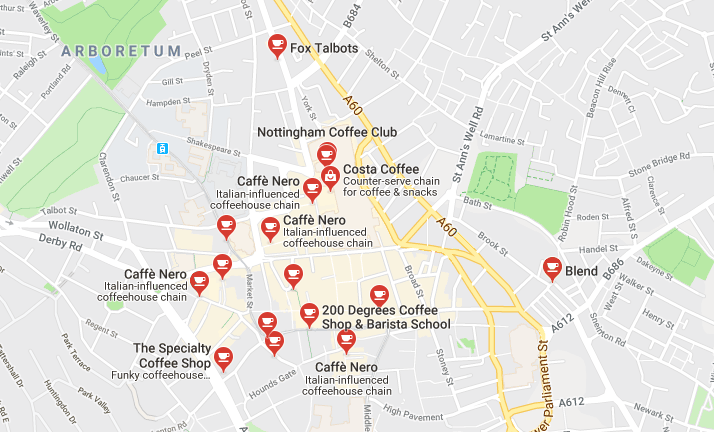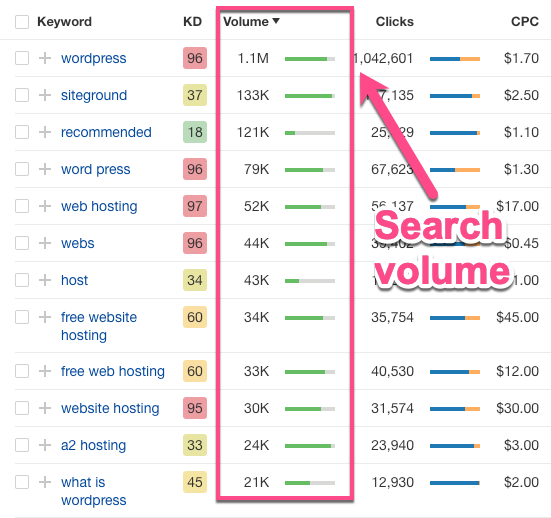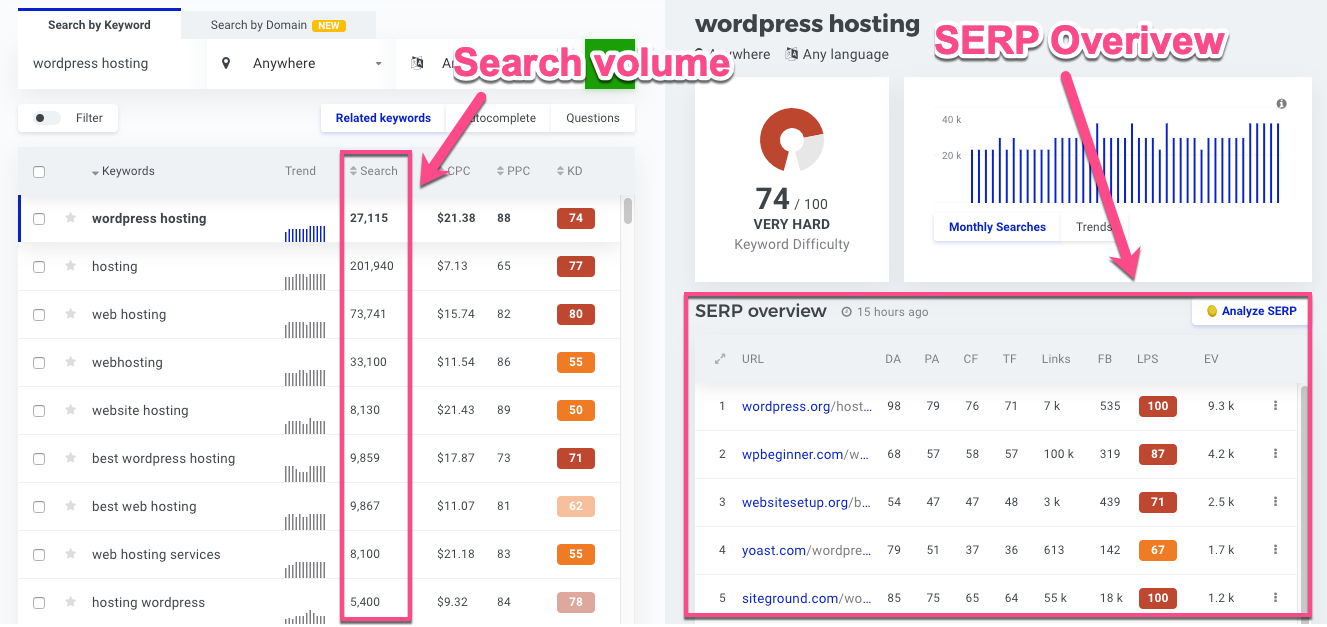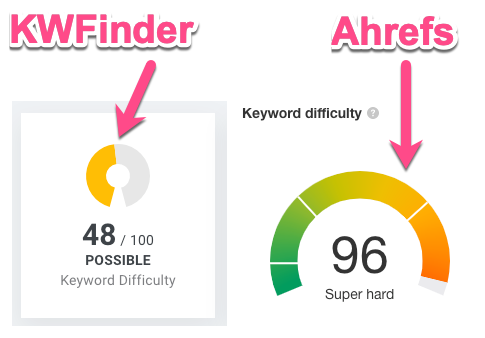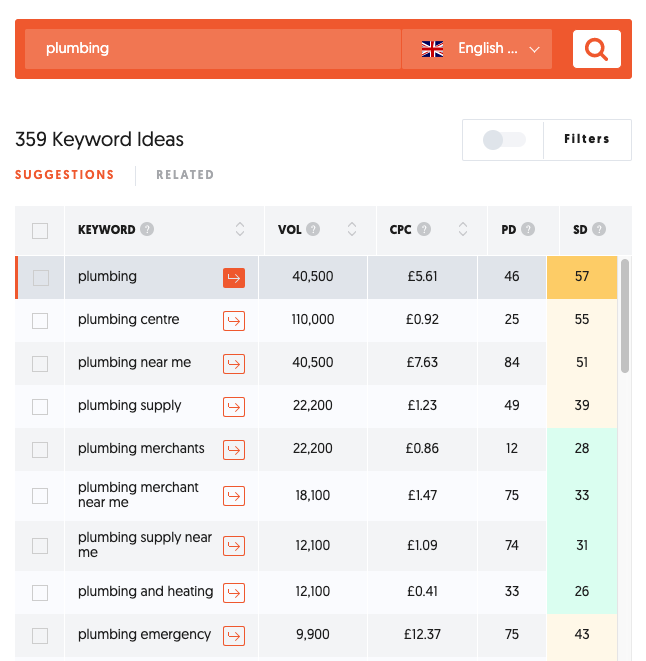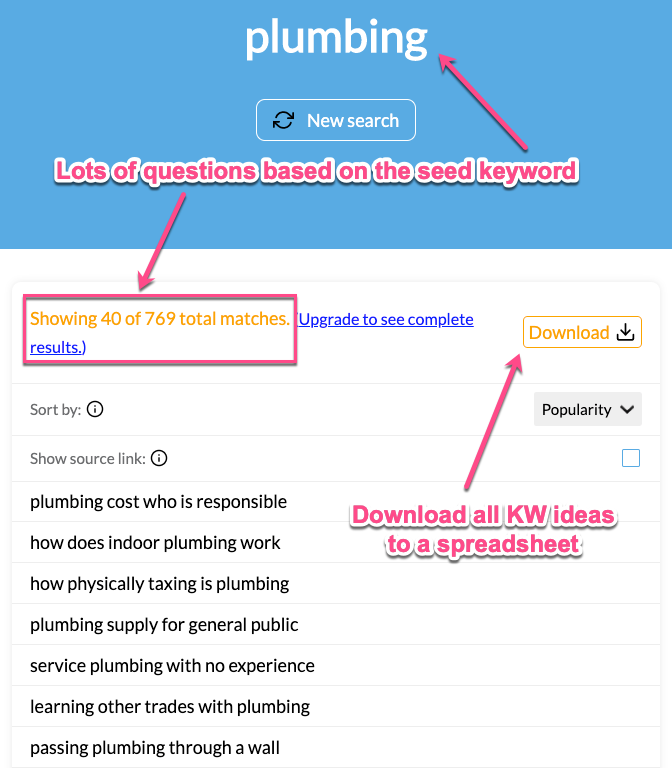How to do Local SEO Keyword Research

Hand off the toughest tasks in SEO, PPC, and content without compromising quality
Explore ServicesKeyword research is an essential part of SEO, as it allows you to make sure that you’re focusing your time and energy on search terms that people are actually using.
SEO can be very time consuming, so you don’t want to spend months of hard work getting to position #1 on Google for a keyword that nobody is searching for.
For companies that rely on local business, Local SEO keyword research is even more essential to get the most from local and mobile searches.
So, what is local keyword research?
Keyword research is the process of finding the search terms that people enter into search engines (let’s be honest, it’s usually Google) while looking for an answer to a query.
When we optimize websites for search engines, one of the main focuses is figuring out which particular keywords or phrases people are searching for. Then, by implementing these keywords in your website, you will hopefully appear high up on the search engine results pages (SERPs) when people search for them.
So far, so good.
When determining which keywords to focus on, we often look at the search volume (how often people perform a Google search for this term), the content of the website and its specific pages, and what competitors are using on their websites.
Local keyword research is an even more specific version of this, as your content needs to resonate with particular locations in order to be seen as being particularly relevant to the search terms.
For example, this may include a generic business keyword plus a city location, such as “plumber Seattle”, or a service-based keyword and a specific region or area, such as “boiler repair Bellevue”.
Why is it important?
There are two main reasons why keyword research is an essential part of a local SEO plan.
The first reason is that many users who perform local searches are searching with intent. That is to say that they are looking to take action or make a purchase in the moment.
29% of consumers who search for a type of local business on a mobile device call or visit that business within 24 hours.
Companies that thrive on local customers should be looking to leverage this intent by focusing on local SEO, and determining which are the most effective keywords is a huge part of this.
The second reason is that users are served personalised results when they perform a Google search, and one of the main factors that determines the results is their physical location.
If you search for “coffee shop” on Google, you won’t be shown the world’s top results for the keyword “coffee shop”.
Instead, you’ll be shown the highest ranking pages within your vicinity. This is because Google wants to show you the most relevant search results.
If you’re in Washington, listings for coffee shops in New York aren’t going to be very useful for you.
Takeaway: know what keywords to target + what locations
Without knowing which keywords are worth targeting and what physical areas you’re likely to see the best results from, you’re missing out on the opportunity to benefit from local searchers who are looking to act now.
And as mobile internet usage has overtaken desktop, it’s important to consider those local mobile users who are looking to act now.
How to do Local SEO Keyword Research
The aim of keyword research for local SEO is to find the most commonly searched, relevant terms for your industry.
Google pays particular attention to relevancy when it comes to the SERPs, and 72% of marketers claim that relevancy is the main leading factor for improving SEO. If your content isn’t relevant to what people are actually searching for, you won’t be appear in their results.
Getting started with finding keywords
Sometimes common sense prevails, but many business owners are unaware of exactly what sort of thing their customers are typing in when they’re looking for a particular product or service.
Researching which keywords have the highest search volume and search intent, allows you to make sure that you’re focusing on the right terms.
It may be tempting to go for high-volume keywords that aren’t particularly relevant to your website in an attempt to get more traffic. This is unwise, as the relevancy of a page’s content to the search term is one Google’s key ranking factors for all searches.
If your website isn’t relevant to the search terms you’re trying to target, not only will you struggle to rank for them but, if you do, visitors will likely bounce, clicking away from your website without interacting.
A high bounce rate is a signal to Google that a webpage is not useful for this particular keyword, and it will be placed lower down in the SERPs.
How to find local keywords for Local SEO
There are many ways to find keywords for your website, but here are some of the most effective.
Find industry related keywords
First of all, identify keywords that are specific to your industry.
This means thinking about what common words and phrases your customers would use to search for your business.
A simple exercise is to ask yourself:
If you were a member of the public looking for your service, what would you type in to Google?
This could be anything from product names to industry-specific terms, which are particularly pertinent in B2B marketing. You can also look at what your competitors are doing for inspiration.
Use keyword modifiers
Next, take advantage of keyword modifiers that could be relevant to searches. These are words that describe the service, quality, type of product or the occasion when they would be used.
Some examples of keyword modifiers include:
- Best
- Top
- Buy
- Cheap
- Where
- How
Words like “cheap”, “fast”, “best”, “free” and “buy” are popular modifiers that people use when searching. Adding these words changes the intent behind the keyword and can improve your clickthrough rate, as they are more enticing.
You can also add modifiers relevant to your industry. For a florist, “wedding”, “birthday” and “delivery” are all relevant keyword modifiers, even though they don’t mention your industry specifically.
Include local-based keywords
The final step in finding keywords for your local SEO campaign is the local element.
People tend to search for business close to them, so it’s important to leverage the geographic location of your business, the areas that it covers, or the areas your target market lives and works in.
Include countries, cities and districts in your meta tags and on-page content, and create location-specific landing pages to provide relevant content for local searchers.
You should also use these locational keywords in blog posts and on social media to further cement your association with the areas you wish to target.
Local keyword research tips:
- Think about the main business keywords. For most local businesses, the primary keywords to target will be fairly obvious. It will be your main service/product + location…
- Include the service in locations. Make sure to add KEYWORD + LOCATION to your metadata. For examples: plumber in New York, auto repair Vancouver, coffee shop London etc.
- Use Google Autocomplete. Just enter your main keyword in Google and take note of the suggestion it generates.
- Spy on your competitors. It’s always worth looking at what your competition are doing, and then trying to do it better.
How to choose which keywords to use
Whatever local search terms you choose to optimize your website for, aim for keywords that offer the highest search volume, but are still relevant to your business.
This will enable you to attract more traffic, which will also help you to maintain a good ranking by showing Google that your website is a relevant result.
It’s worth bearing in mind, however, that this will mean that you are facing more competition for fewer spots on the SERPs. This is why it’s important to boost your local SEO by focusing on on-page SEO, social signals and link building as well, giving your website a solid foundation.
Don’t forget: Proximity to Searcher
Because Google now takes a searcher’s physical location into account, this means that local businesses can benefit from targeting broader and more competitive search terms.
For example, terms like “hotel” are highly competitive but quite vague in their nature. When combined with local SEO and personalised search results, local businesses stand a great chance of showing up in the top results for these high-competition, high-traffic keywords.
Remember that, whatever keywords you pick, it’s essential to maintain good SEO health for your website as a whole through link building, social media and creating quality content. If your overall SEO is poor, you won’t rank well regardless of your chosen search terms and their search volumes and keyword difficulty.
Oh, and you’ll need help from some tools to actually see volumes and difficulties:
Keyword research tools (& how to use them)
While Google’s Keyword Planner is the most commonly cited tool for keyword research, there are many other tools that you can use to find local keywords.
Here are just a few:
- Ahrefs Keywords Explorer
- AnswerThePublic
- Keywords Everywhere
- Moz Keyword Explorer
- SEMRush
- Suggestion Keyword Finder
- Ubersuggest
- QuestionDB
- SE Ranking
Everyone has their own preference when it comes to keyword research tools. Have a play around, see what works for you.
Here’s how you can grab useful keyword data from some of these tools:
How to find Search Volume for your local keywords
Finding the search volume is pretty easy and there are a couple of tools that can do the heavy lifting for you:
Ahrefs Keyword Explorer
Go to the Ahrefs Keyword Explorer, enter your keyword (or list of terms) and Ahrefs will find the search volume for each term as well as other useful metrics like keyword difficulty, CPC and how many average monthly clicks the keyword gets in the search results.
KWFinder
KWFinder is a great tool for doing quick keyword research. Drop in your keyword and you’ll get useful data like search trends, volume, difficulty scores as well as a useful overview of the SERPs for that keyword.
Keywords Everywhere Add-on
You can even check search volumes without leaving the SERPs with the super handy Keyword Everywhere Chrome add-on. Obviously not as practical when it comes to big keyword lists, but it is useful for grabbing data on the fly. Oh, and it’s completely free.
SE Ranking
SE Ranking keyword suggestion tool is a perfect choice in terms of local SEO. The tool has the biggest keywords database for the US market and gives you the data for a complete overview of any topic you may need. Just enter a keyword, and along with other metrics, the tool will give you its search volume, difficulty, and organic SERP results. Choose between lists of similar, related, and long-tail keyword suggestions to find the ones that will work best for you.

How hard will they be to rank for (aka; Keyword Difficulty)
Keyword difficulty is another factor to consider. Some terms are easier to rank for, so it’s worth weighing up whether you should put in the effort to optimize pages for difficult keywords or opt for slightly lower-hanging fruit.
If a keyword is extremely relevant to your business, however, don’t discount it just because it has a high keyword difficulty.
Different keyword research tools use different methods to work out difficulty scores for keywords:
- Ahrefs: Keyword Difficulty is an estimate of how hard it would be to rank in top 10 organic search results for a given keyword. It is measured on a non-linear scale from 0 to 100 (low difficulty to high difficulty).
- KWFinder: The calculation is based on the selected metrics by Moz, Majestic and our know-how, namely: Domain Authority, Page Authority, Citation Flow and Trust Flow.
Expanding your keyword list
Putting your main keyword into a tool like Ubersuggest is a great (and quick) way to generate keyword variations and expand your list.
Finding question-keywords people ask
QuestionDB makes it easy to get a list of question based keywords. Just drop in a seed keyword or topic and it will quickly generate you a big list of keywords (that you can also export to a spreadsheet):
AnswerThePublic is another quick way to generate massive list of questions people ask about a keyword:
Don’t worry, there is the option to toggle it into a more easy to read view, as well as export it as a spreadsheet.
Final Thoughts
Local SEO is an ongoing process that requires continual nurturing and attention for various different platforms and ranking factors. Local keyword research is therefore an integral step to make sure that your efforts don’t go to waste.
The most important things to remember when it comes to keyword research for local SEO are:
- Find and focus on keywords with high search volume.
- Leverage broad, high-competition keywords for local search.
- Make sure your content is relevant to your targeted keywords.
- Don’t neglect your overall SEO campaign.
Hand off the toughest tasks in SEO, PPC, and content without compromising quality
Explore Services





